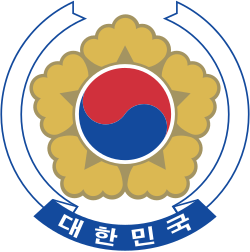| | Majority party | Minority party | Third party |
|---|
| |  |  |  | | Leader | Kang Jae-seop | Son Hak-gyu | Suh Chung-won |
|---|
| Party | Grand National | United Democratic | Pro-Park |
|---|
| Last election | 121 seats [a] | 161 seats [b] | Did not exist |
|---|
| Seats won | 153 | 81 | 14 |
|---|
| Seat change |  32 32 |  80 80 | New |
|---|
| Constituency vote | 7,478,776 | 4,977,508 | 637,351 |
|---|
| % and swing | 43.45% ( 5.55pp) 5.55pp) | 28.92% ( 20.16pp) 20.16pp) | 3.70% (New) |
|---|
| Regional vote | 6,421,727 | 4,313,111 | 2,258,750 |
|---|
| % and swing | 37.48% ( 1.71pp) 1.71pp) | 25.18% ( 21.05pp) 21.05pp) | 13.18% (New) |
|---|
| | | Fourth party | Fifth party | Sixth party |
|---|
| |  | | | | Leader | Lee Hoi-chang | Chon Young-sae | Han Myeon-hee |
|---|
| Party | Liberty Forward | Democratic Labor | Creative Korea |
|---|
| Last election | Did not exist | 10 seats | Did not exist |
|---|
| Seats won | 18 | 5 | 3 |
|---|
| Seat change | New |  5 5 |  3 3 |
|---|
| Constituency vote | 984,751 | 583,665 | 72,803 |
|---|
| % and swing | 5.72% (New) | 3.39% ( 0.92pp) 0.92pp) | 0.42% (New) |
|---|
| Regional vote | 1,173,463 | 973,445 | 651,993 |
|---|
| % and swing | 6.85% (New) | 5.68% ( 7.35pp) 7.35pp) | 3.81% (New) |
|---|
|
|





